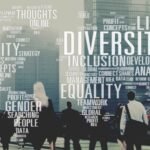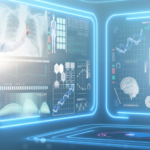The Future of HR: Exploring AI and Automation in Human Resource Management
The realm of Human Resource Management (HRM) is undergoing a transformative shift with the integration of Artificial Intelligence (AI) and automation technologies. As organizations embrace digital innovation, HR departments are leveraging AI-driven tools to streamline processes, enhance decision-making, and elevate the employee experience. In this blog, we will delve into the future of HR by exploring how AI and automation are reshaping various aspects of human resource management, from recruitment to employee engagement.
The Role of AI and Automation in HR:
- Recruitment and Talent Acquisition: AI-powered tools are revolutionizing the recruitment process. Machine learning algorithms can analyze vast amounts of data to identify top candidates, predict candidate success, and match skills to job requirements more accurately.
- Candidate Screening: Automated screening processes evaluate resumes, online profiles, and applications to shortlist candidates. This expedites the initial selection process while reducing human bias.
- Interviewing and Assessment: Virtual interview platforms equipped with natural language processing and sentiment analysis capabilities assess candidates’ verbal and non-verbal cues to gauge their suitability for the role.
- Onboarding and Training: AI-driven chatbots provide personalized onboarding experiences, answering employee queries, providing training resources, and facilitating a smoother transition into the organization.
- Employee Engagement and Satisfaction: AI-powered sentiment analysis monitors employee feedback, surveys, and social interactions to gauge morale and identify areas for improvement.
- Performance Management: Automation tools facilitate real-time performance tracking, enabling managers to provide timely feedback, set goals, and identify development opportunities.
- Data-Driven Insights: AI algorithms analyze workforce data to identify trends, predict turnover, and offer insights for strategic decision-making.
Benefits of AI and Automation in HR:
- Efficiency and Time Savings: Automation streamlines repetitive tasks, enabling HR professionals to focus on strategic initiatives and high-value activities.
- Enhanced Decision-Making: Data-driven insights and predictive analytics guide informed decision-making, leading to better talent management and organizational planning.
- Reduced Bias and Fairness: AI helps mitigate unconscious bias in recruitment and talent management processes, promoting diversity and inclusion.
- Personalized Experiences: AI-driven tools personalize employee experiences, improving engagement, learning, and career development.
- Scalability: Automation supports HR departments in managing larger workloads and responding to organizational growth.
- Improved Employee Relations: AI-powered chatbots provide timely responses to employee queries, fostering better communication and relations.
Challenges and Considerations:
- Privacy and Data Security: AI implementation requires robust data protection measures to ensure employee data remains secure and compliant.
- Change Management: Successfully integrating AI and automation requires proper change management to address employee concerns and facilitate a smooth transition.
- Ethical Use of AI: Ensuring AI algorithms are free from bias and discriminatory outcomes is critical to maintaining fair and equitable practices.
The future of HR is intricately intertwined with the evolution of AI and automation technologies. By embracing these innovations, organizations can optimize HR processes, enhance decision-making, and elevate the employee experience. However, it is essential to strike a balance between technology and the human touch. The human element remains crucial in cultivating a culture of empathy, collaboration, and mentorship. As the HR landscape continues to evolve, organizations that harness the power of AI and automation while upholding core human values are poised to shape a future of dynamic and empowered workplaces.


































